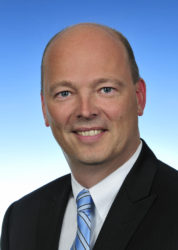The Future of Electric Mobility:
Volkswagen’s North American Market

Engineers from regional corporations, agencies, universities, schools, and professional associations, came together to kick off Engineers Week 2017 at The Chattanoogan conference center. Planning for the future was the theme of the Kick-Off Lunch featuring Dr. Burkhard Huhnke, Senior Vice President of e-mobility at Volkswagen America, Inc. Chattanooga is home to Volkswagen’s USA manufacturing plant and it was fitting that Dr. Huhnke shared Volkswagen’s transformation into the era of digitalization. Dr. Huhnke initiated and implemented Europe’s largest test laboratory for automative battery packages and components, worked on Volkswagen’s e-traction projects, e-Golf and e-Up, and currently oversees the product line of Volkswagen’s electrical cars in North American.
Hunke launched e-week 2017 with his presentation, “The Future of Electric Mobility: Volkswagen’s North American Market.” He explained that Electric Mobility combines electrical driving with connectivity and is how transportation and mobility are evolving. Volkswagen is changing and has already launched electric cars. The next generation of VW cars will revamp the entire company as it reflects and adjusts for societal changes.
As Hunke outlined those societal changes, the audience nodded and smiled in understanding and agreement.
1. We are always online. For drivers, this can be dangerous. The fatality numbers on the road are rising. We have to ensure that that distracted driving doesn’t continue.
2. Digitization increasingly connects everything. Transportation is adjusting as companies like Uber emerge and edge out traditional models.
3. Entrepreneurship generates new competitors, such as Tesla, that bring into the market with electronic cars and autonomous driving to the market and widespread public use.
The future that is emerging includes alternative transportation possibilities that will challenge us physically and emotionally. Will we continue to own our own cars? Will we share car ownership? Will drones provide public transportation? Going forward, engineers will be needed to work through all of these challenges and changes.
Volkswagen’s goal is to position itself as the driving force behind electrical mobility. Starting in 2020, Volkswagen will launch a new family of electric cars. By 2025, VW expects to sell one million electric cars. This means a new architecture for the cars: no combustion engines and no plug-in hybrids. It requires getting the internet into the car.
The new Mobility-Service-Eco-System Cars will have a fast-charging battery with a large range. These new batteries will be flat, simple, scalable, and inexpensive. The design gives the extra space back to the driver.
As intelligence is integrated into the car, its features will be continually updated. The e-platform will launch features automatically and integrate users demands and choices. Volkswagen is now researching how to make the design user-friendly across multiple cultures. An understanding of cultural differences is part of making the intelligence applicable whether in New York, Paris, or China.
There will be a shift in the business model to get in front of the consumer more efficiently. Traditionally, the manufacturer and the car dealers partnered in the sale of the cars. In the future, there will be new opportunities, new business players, and new revenue streams, including subscription services. Accommodating customers request for full connectivity through their internet access, the cars will provide fresh software, new features, updates, and the latest apps. Tomorrow’s cars will be “smart devices on wheels.”
One of Hunke’s goals and of the e-week events is to inspire young people to become the engineers of the future. With academic colleagues, Dr. Huhnke initiated the Volkswagen Innovation Center (VAIL) at the Stanford University Campus. He was the project leader for the autonomous car Volkswagen Passat Junior, participating in the Pikes Peak hill climbing driverless Audi TTS. Currently, he is a member of the Board of Advisors at the College of Engineering and Computer Science at the U of TN Chattanooga (CECS at UTC).
 E-week’s connection to education and young people was highlighted at the conclusion of this kick-off event by featuring the presentation of scholarship funding by Chattanoogan companies and organizations to local education institutions. Later in the week, Lulu Copeland, Chattanooga E Week committee coordinator and Executive Director, Economic & Workforce Development at Chattanooga State Community College, planned STEM Girls Day on her campus. The program reflects ongoing efforts to involve young women in Science, Technology, Engineering, and Mathematics.
E-week’s connection to education and young people was highlighted at the conclusion of this kick-off event by featuring the presentation of scholarship funding by Chattanoogan companies and organizations to local education institutions. Later in the week, Lulu Copeland, Chattanooga E Week committee coordinator and Executive Director, Economic & Workforce Development at Chattanooga State Community College, planned STEM Girls Day on her campus. The program reflects ongoing efforts to involve young women in Science, Technology, Engineering, and Mathematics.
The STEM Girls Day and all the organizations involved in E Week, from corporations like Volkswagen to civic groups such as the International Business Council of the Chattanooga Area Chamber of Commerce, illustrate how a small Southern City can be at the forefront of our innovative future.
- Inter-generational education needed now – by Deborah Levine - April 19, 2024
- Tracking our Terrorist Destructors – by Deborah Levine - April 19, 2024
- UNTOLD Stories of a World War II Liberator - April 10, 2024
